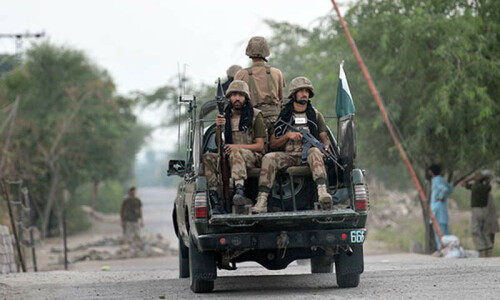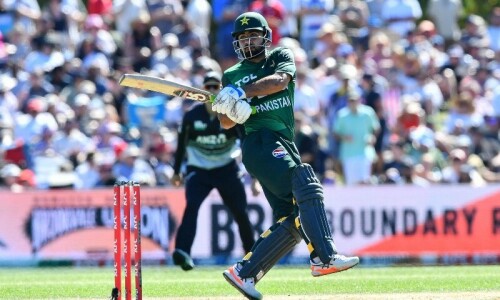THE scene at the Edhi morgue near Sohrab Goth is as it normally is, though many not connected with the facility would find it grim. One after another, dead bodies picked up from all over the metropolis are brought here to be moved to Mowachh Goth for burial, or to be handed over to the family of the deceased.
In a curious way, the stoic handling of the dead suggests life, too: the staff of the country’s largest charity is at work round the clock, unruffled by any situation this beleaguered city might throw up at any moment. For years, the morgue staff have offered the deceased, often nameless and unclaimed, some degree of dignity in their death. Now, they have added another service: they record the thumb impression of every unclaimed body before the remains are moved into the facility’s cold storage.
The exercise is part of the newly launched project Shanakht [Identity], an effort to identify and trace the family of the unidentified. It uses biometric scanning technology — a system that took almost three decades and the burial of more than 200,000 unclaimed corpses in the 30-acre Mowachh Goth graveyard of the Edhi Foundation to be developed.
“It was launched just a few weeks ago,” Amir Hassan of the Citizens-Police Liaison Committee (CPLC) told me as we sat in his cubicle just along the main entrance of the morgue. “Since its launch, we have been collecting the relevant details of all unclaimed or unidentified bodies being brought here. After establishing and tracing all identity links, we inform the family of the dead person about his or her demise.”
A mechanical engineer by qualification and a businessman by profession, Hassan shared how this came about. A few months ago a case was reported to the CPLC: a man had left his office in the evening and till midnight, hadn’t made it home.
After having done the rounds of hospitals, police stations and relatives’ houses, he was finally found dead at the Edhi morgue. He had been run over by a vehicle near Sharea Faisal, minutes after leaving the office, and had for want of identification been brought to the Edhi morgue by the police.
“He could have been buried as an unclaimed or unidentified body if the family hadn’t managed to reach the morgue that day,” Hassan said. “That thought convinced the people at the helm of affairs at the CPLC to devise a system that could resolve such matters. So we made it, finally, with the help of the National Database and Registration Authority [Nadra].”
Hassan’s story reminded me of my July 2010 meeting at the same place with Keamari’s Rahman Baba. His exhausting search for his 28-year-old son Naimat Shah ended on July 27, 2010, more than a month after the latter’s disappearance. In the end, Shah’s family learned that he had been buried as an unidentified body in the Edhi Foundation’s Mowachh Goth graveyard. Shah was one of the 2,980 unidentified people the Edhi Foundation buried that year.
It used to be that only a small number of the dead would later be identified by their next of kin, after they had leafed through the photograph album of buried persons kept at the Edhi morgue. Now, CPLC chief Zubair Habib believes that every unclaimed corpse is being identified through technology and software that his organisation has developed “to serve the people”.
“Unidentified bodies are being identified through biometric scan technology by utilising the Nadra databank,” he said. “We have established a special desk at the Edhi morgue to carry out the task in collaboration with the officials at the facility. The cooperation being extended by Nadra is exemplary.”
He appealed to people to contact the CPLC helplines for assistance or in order to locate anyone found dead by the Edhi Foundation. How well the CPLC is doing that job was defined by Ghulam Hussain, the key man behind the Edhi Foundation’s morgue and graveyard services.
“As the unclaimed body arrives here, we first take multiple thumb impressions,” he said, showing me a number of folders set up on his desktop, each carrying soft copies of thumb impressions of the dead. “All impressions are sent online to Nadra through CPLC software, with all the relevant police and medico-legal details. Nadra takes a day or two and sends us the family details.”
Before I could ask him what comes next, his mobile phone rang and he walked off. A few minutes later, he returned and told me about the conversation he’d just had, which left no room for any further questions about Shanakht.
“It was a man calling from Ladha [a subdivision in South Waziristan],” he said. “We received an unidentified body with bullet wounds a couple of days ago. We took his thumb impressions, sent the information to Nadra and after a day or two, they gave us details of the victim’s family, who live in South Waziristan. Yesterday, we approached the political agent in South Waziristan, telling him about the victim and the details of his family. His brother just called me; he’s coming tomorrow to receive the body.”
Published in Dawn, November 1st, 2015
On a mobile phone? Get the Dawn Mobile App: Apple Store | Google Play













































